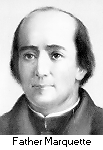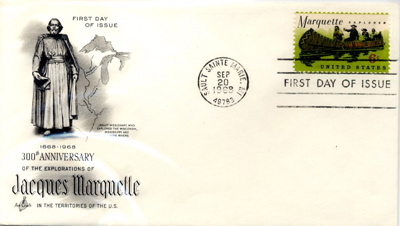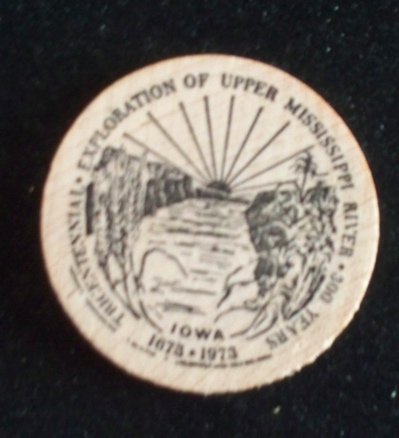Encyclopedia Dubuque
"Encyclopedia Dubuque is the online authority for all things Dubuque, written by the people who know the city best.”
Marshall Cohen—researcher and producer, CNN
Affiliated with the Local History Network of the State Historical Society of Iowa, and the Iowa Museum Association.
MARQUETTE, Jacques
MARQUETTE, Jacques. (Laon, France, June 1, 1637-near Ludington, MI, May 18, 1675). Frenchman Jacques Marquette became an explorer in the mid-1600s. At age 17, Marquette joined the Society of Jesus and became a Jesuit missionary. He studied and taught in the Jesuit colleges of France for about twelve years before his superiors assigned him in 1666 to be a missionary to the nztive people of the Americas. He traveled to Quebec, Canada, where he demonstrated his talent for learning Native American languages. Marquette learned to fluently speak in six different Native American dialects and became an expert in the Huron language.
In 1668, Marquette was sent to establish more missions farther up the St. Lawrence River in the western Great Lakes region. He helped establish missions at Sault Ste. Marie in what is now Michigan—the state's first European settlement—in 1668 and at St. Ignace, also in Michigan, in 1671.
On May 17, 1673, Marquette and his friend Louis JOLLIET , a French-Canadian fur trader and explorer, were chosen to lead an expedition that included five men and two canoes to find the direction and mouth of the MISSISSIPPI RIVER, which natives had called Messipi, "the Great Water."
Despite sharing a goal to find the river, the two leaders' ambitions were different: Joliet, an experienced mapmaker and geographer, was focused on the finding itself, while Marquette wanted to spread the word of God among the people they met.
Marquette's group traveled westward to Green Bay in present-day Wisconsin, ascended the Fox River to a portage that crossed to the Wisconsin River and entered the Mississippi near Prairie du Chien on June 17, 1673. Following the river to the mouth of the Arkansas River—within 435 miles of the Gulf of Mexico—Marquette and Joliet learned that it flowed through hostile Spanish territory. Fearing an encounter with Spanish colonists and explorers, they decided to return by way of the Illinois River in mid-July.
While Joliet continued on to Canada to relay news of the expedition and its discoveries, Marquette stayed behind in Green Bay. In 1694, he set out to found a mission among the Illinois Indians. As a result of the cold winter weather, he and two companions camped near the site of what is now Chicago, becoming the first Europeans to live there. In the spring, Marquette reached the Indians he sought, but illness—dysentery he contracted while on his mission—forced him to return home. He died on May 18, 1675, en route to St. Ignace at the mouth of a river later named Père Marquette in his honor.





